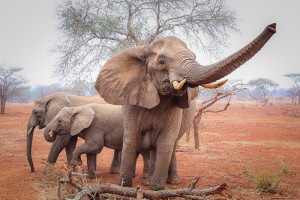Elephants Sense Trouble
Thursday, March 12th, 2015March 12, 2015

South African elephants may be good at smelling out explosives. Credit: © Moments by Mullineux/Shutterstock
Can elephants really sniff out danger? The United States Army Research Office seems to think so. In South Africa, elephants are being used to identify explosives by smell, just like dogs, which have a long history of detecting explosives. In multiple tests, elephants were led to a line of buckets. One of the buckets had an object as small as a cotton swab laced with TNT. The elephants correctly identified the bucket containing TNT almost every time. These results have raised speculation about whether an elephant’s strong sense of smell can truly save lives.
This project stemmed from an observation that elephants carefully avoid mine-filled areas in Angola after many years of civil war. Researchers found that some elephants seemed to intentionally avoid the minefields. However, researchers were not sure it was a scent that kept the elephants away. They questioned if the elephants associated the area with danger because many elephants have died there in the past. Or, could their trunks warn them to steer clear?
An elephant’s trunk, which can measure 5 feet (1.5 meters) and weigh 300 pounds (140 kilograms), is a combined nose and upper lip. An elephant smells and breathes with its trunk and uses its trunk to sniff the air and the ground constantly. Its sense of smell is more sensitive than that of any other animal.
With African elephants being the largest animals to live on land, it would not make sense to herd them around minefields to sniff out danger. And, no one would want to risk the safety of these animals, as they are vulnerable to becoming extinct because of poaching. So, instead, researchers would use unmanned drones to collect scent samples from mined areas and bring the samples back to the elephants. A trained elephant would sniff the samples and alert human handlers to any signs of explosives. Researchers are also hoping to copy an elephant’s sense of smell and incorporate it into electronic sensors that detect threatening materials.
Other Worldbook articles:


